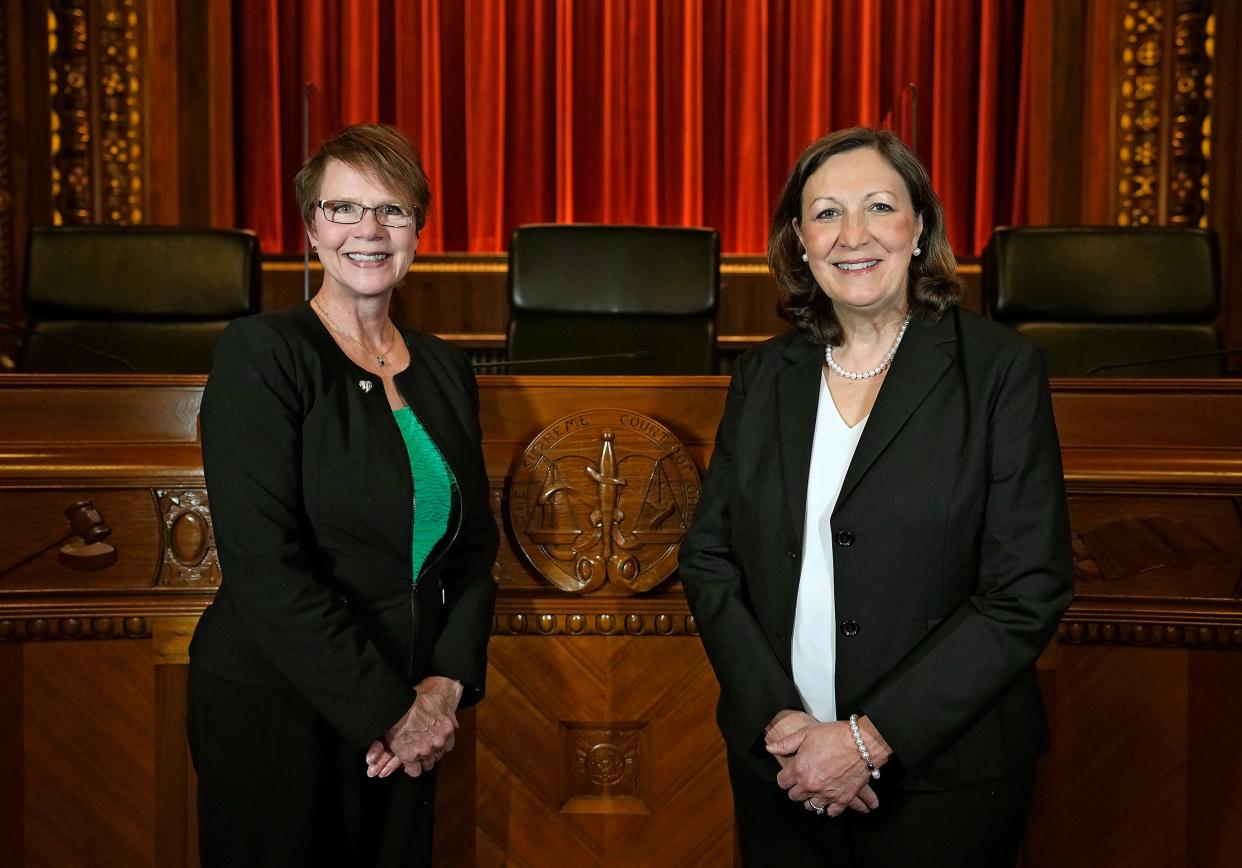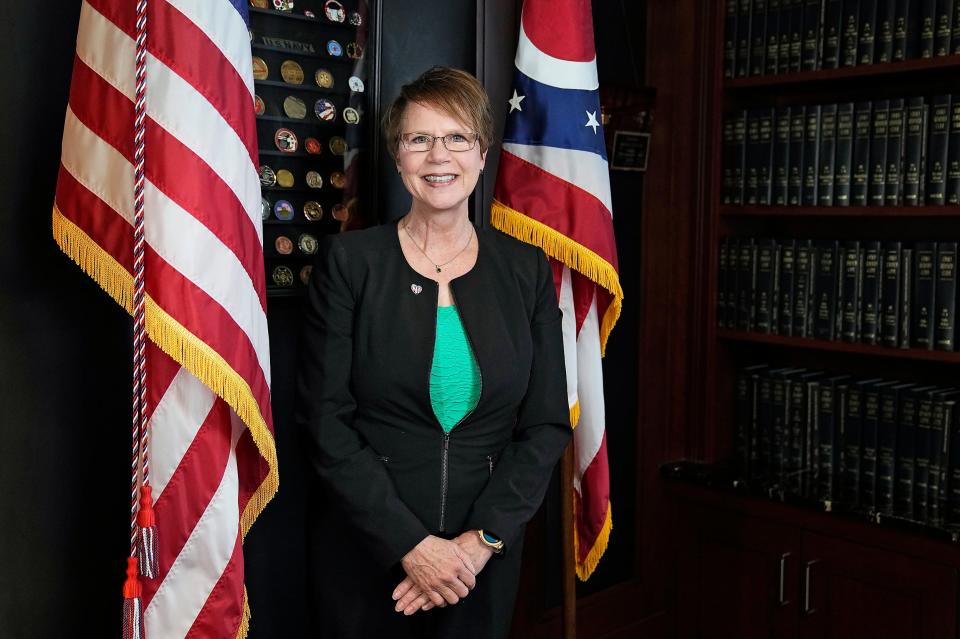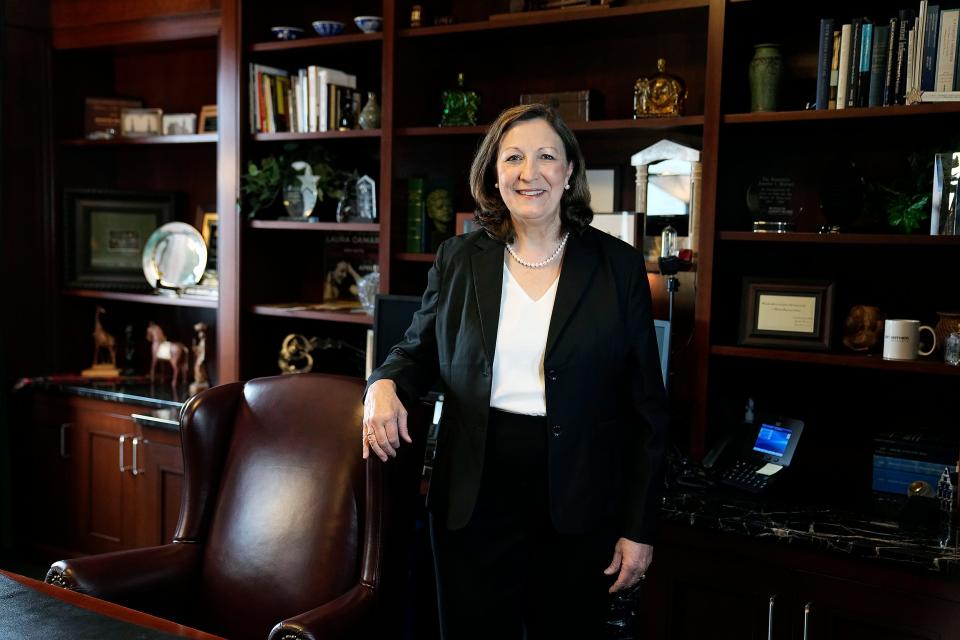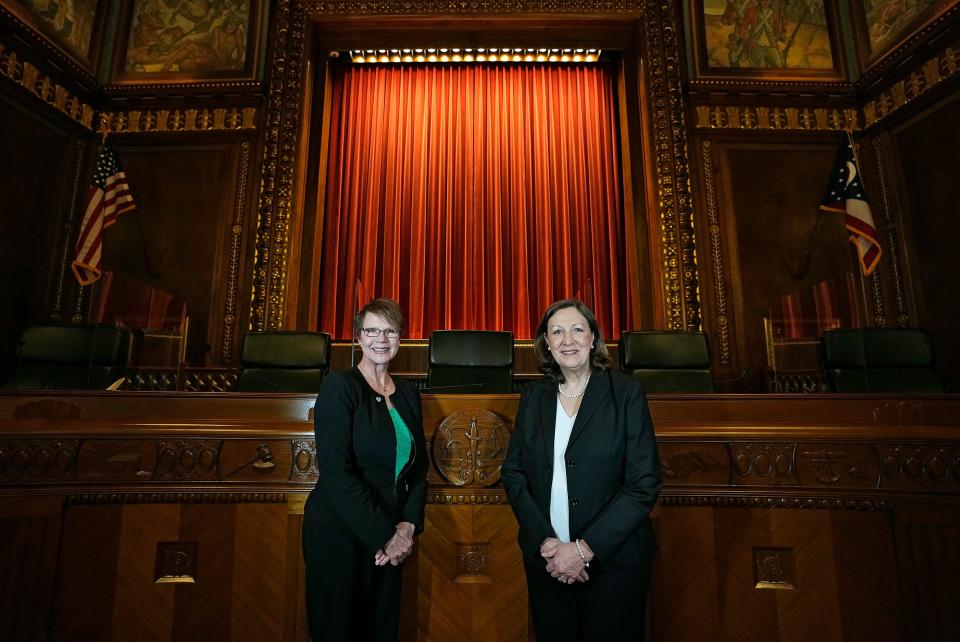Election 2022: Justices Sharon Kennedy, Jennifer Brunner face off for Ohio Supreme Court chief justice

- Oops!Something went wrong.Please try again later.
- Oops!Something went wrong.Please try again later.
If there is one thing to be learned in Ohio's protracted redistricting fight it's this: Who sits on the Ohio Supreme Court is very important.
Ohio Republicans have controlled a majority of seats on the seven-member high court since 1986. The current balance is four Republicans and three Democrats.
Republican Chief Justice Maureen O'Connor sided with Democrats in the key redistricting case over legislative and congressional maps.
Beyond redistricting, though, Supreme Court decisions impact how much Ohioans pay in taxes, whether utility companies can add fees to ratepayers' bills, how insurance and business laws are interpreted, what government records will be available to the public and more. Justices serve six year terms.
Due to age limits, O'Connor cannot run again, which means the chief's seat is open for the first time since 2011. The chief sits on the court with the other six justices and is the top administrator for the judicial branch but can also focus on criminal justice issues.
Here is a look at the two justices – Republican Sharon Kennedy and Democrat Jennifer Brunner – running to be the next chief justice.
Ohio Supreme Court chief justice seat open for first time since 2011
Kennedy and Brunner don't have to give up their seats to go for the chief's job since neither are up for reelection this year. But when one of them wins, her replacement will be appointed by Gov. Mike DeWine.

Kennedy fulfilled her childhood dream of becoming a cop in the early 80s when she joined the Hamilton police force – a job that regularly took her inside courtrooms. She had an epiphany while sitting on a witness stand, experiencing a terrible cross examination.
"Wow. If this guy can make it through law school, I can too. I'm a heck of a lot smarter," Kennedy said. After graduating University of Cincinnati law school, Kennedy worked as a solo practitioner and later ran for domestic relations judge.
She describes herself as a proven problem solver who listens to others before deciding what the solution should be.

Brunner said as a high school student, she didn't even know women could be attorneys because ads for jobs were segregated for men and women. She emphasizes her experience as Ohio secretary of state and as a judge at the trial, appellate and supreme court levels.
"I really value being an attorney and for me, the judiciary is sacred," Brunner said. "I know that for some people it's the last bastion of fairness and that's why I'm willing to run and willing to serve. If given the chance, I'll work to put everything I have into it."
Brunner and Kennedy have overlapped on the Ohio Supreme Court for less than two years but they have split on key cases and issues.
Brunner is on record as a strong supporter of O'Connor's push for a statewide criminal sentencing database, which would collect uniform data across Ohio courts so the public could easily look for patterns and disparities in how similarly situated people are sentenced in similar crimes.
Kennedy said there are too many unanswered questions about how the system would operate.
"There are no rules yet and no one has a clear understanding of the transparency parts of this, of what is it the public is going to be allowed to see versus the court versus its collection versus its ownership," Kennedy said.
Balance of the court: 2022 election will bring different Ohio Supreme Court to ongoing redistricting battles
Both women describe themselves as supporters of the rule of law and an independent judiciary.
"A judge must never lose sight that she is a public servant and that reverence for the rule of law is what best serves the public," Brunner said.
Kennedy also said she believes judges must constrain themselves to strict readings of the plain language of laws and avoid making policy from the bench. “Judicial legitimacy is confined to ourselves in interpreting only the written words. ”
Brunner said "There is a time to be restrained and there is a time to fully occupy your lane and sometimes it takes a lot of courage to do that. Sometimes it may not be popular and you're never going to please everyone but there is a time to step up."
What are Brunner and Kennedy's priorities if elected?
As chief, Brunner said her agenda would include:
Continuing work on the statewide criminal sentencing database and special docket courts to handle people with drug addiction, mental illness or other issues.
Increasing the number of cases the high court accepts for review.
Using technology to make courts more efficient and accessible.
Addressing issues of racial fairness.
As chief, Kennedy said her agenda would include:
Assisting local courts to clear backlogs of cases.
Helping expand and strengthen drug treatment in lieu of conviction programs.
Continuing civic education efforts to help Ohioans understand what the courts do.
What are some of Brunner's and Kennedy's key rulings?
The two women diverge on rulings as well:
Training for K-12 staffers who are armed: In June 2021, Kennedy argued in her dissent in a case that teachers and school staff did not need extensive police training. Brunner said school workers must have the same amount of training as police officers.
Redistricting maps: This year, Brunner sided with the majority that found the Republican-drawn legislative and congressional maps were unconstitutional. Kennedy would have upheld them.
Bail: In January, Brunner and Kennedy split over a ruling on what elements courts must consider when setting money bail in criminal cases. Bail is set to guarantee the accused will show up for future court dates. Brunner joined the majority, which cited a state law and found that a court may not impose excessive bail for the purpose of keeping the accused in jail. Judges may still deny bail for defendants if it's found they pose a substantial risk to public safety.
And before Brunner joined the court, Kennedy made some key rulings:
Utility fees: In June 2019, Kennedy dissented in a 4-3 decision that found Akron-based FirstEnergy Corp. could not collect an extra fee, called a distribution modernization rider, from customers' electricity bills.
Employee privacy: In August 2020, Kennedy authored a majority opinion that said workers can't sue their private sector employers that use the "direct observation method" for drug tests – that's when someone watches the employee urinate in a cup.
Mass shooter records: In December 2020, Kennedy dissented in a public records case that found the Dayton mass shooter's school records should be kept private. Kennedy argued that the use of present tense in state law opened the door for releasing the records after death.
What are Brunner's and Kennedy's qualifications?

Both Brunner and Kennedy have long histories in public service and as judges.
Kennedy: Ohio Supreme Court justice, 2012 to current; Butler County Common Pleas Court Domestic Relations judge, 1999-2012; attorney since 1991; former Hamilton police officer. Bachelor’s and law degrees from University of Cincinnati.
Brunner: Ohio Supreme Court, January 2021-current; 10th District Court of Appeals judge, 2015-2020; 2010 candidate for U.S. Senate; Ohio Secretary of State, 2007-2010; Franklin County Common Pleas Court Judge, 2000-2005. Attorney since 1983. Bachelor’s degree from Miami University; law degree from Capital University.
Laura Bischoff is a reporter for the USA TODAY Network Ohio Bureau, which serves the Columbus Dispatch, Cincinnati Enquirer, Akron Beacon Journal and 18 other affiliated news organizations across Ohio.
Get more political analysis by listening to the Ohio Politics Explained podcast
This article originally appeared on Cincinnati Enquirer: Who is running for Ohio Supreme Court chief justice in 2022?

